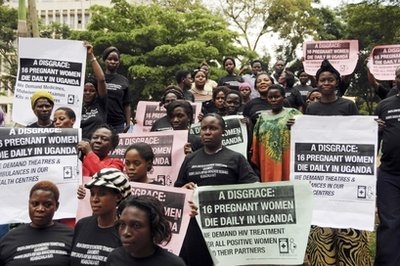By; Ikirimat Grace Odeke (Program officer , Sexual Health improvement Project
It was the day before we broke off for the Christmas holiday. I was wrapping up at the office when a phone call came from 400 kilometers away. On the other end of the line was John, a student nurse and sexual health educator, and my colleague at the Sexual Health Improvement Project (SHIP). He urgently wanted advice on how best to handle the ordeal of an 11-year-old girl who was raped by a man two years ago.
The girl reported the abuse to her mother, who concealed the matter after receiving a bribe from the perpetrator. The mother warned the little girl never to tell anyone what had happened. “Sarah has just revealed this to me after she tested HIV+ during our outreach visit today,” John said in a poignant tone. “She is emaciated, weak, and malnourished. I need advice on how best to handle this delicate issue.” As I listened, I found myself baffled both by the details of Sarah’s story and by the fact that her situation is all too common in Uganda: This is the reality girls are grappling with in my community.
As coordinator of SHIP, it is my job to help young people like Sarah who confide in our sexual health educators. We are now connecting Sarah to the local health facility for treatment and are getting in touch with the District Probation Officer who is in charge of children’s affairs to take up the issue. Setting the wheels in motion to get Sarah out of her predicament reminds me of my own path to this work, and of all the reasons we urgently need sexual health education. Rape, incest, teen pregnancy, and transmission of AIDS are all serious problems in Uganda. I believe the only way to combat these situations is to address the cultural and social issues that cause them. I know that education is our most powerful tool to create a safer and healthier future for Uganda’s youth. SHIP’s vision is a society of healthy young people empowered to make informed and responsible decisions regarding their sexuality. And with more than 70 percent of Ugandans under 24 years, we’ve got no time to lose.
Navigating Adolescence Alone
A girl is considered a woman in my community when she develops breasts. Adolescents who have never been prepared for this stage of life are surprised and frightened. How can we blame them when things go wrong?
My own adolescence was challenging, yet punctuated with excitement, exploration, discovery, and vulnerability. My parents never talked to me about growing up. Friends told me about maturation, menstruation, and relationships with boys. Of course these were mixed messages. I grew up in a remote area, without TV; the small radio was only tuned in by my father for the news broadcast or his favorite music channel. I vividly remember the day my mother found me stealthily reading Drum, a fashion, music, and relationships magazine. She scolded and beat me. “So you have started reading this kind of magazine, do you want to get spoiled!” she shouted.
My mother’s rage is a typical scenario in Uganda, where parents talking about sex with their children is simply taboo. Because of these cultural realities, it was up to me to make decisions on sensitive matters that none of my parents wanted to discuss. I have no sister, so I was confronted with big issues for which I had no solutions.
When I was 15 years old, one of the big boys in my class used to tease and abuse me with inappropriate touches. I did not know how to deal with this situation. I began hating school and my self esteem was affected. Fortunately he left our school, but I continued to be confronted by all sorts of unfair situations. I thought the world just hated me. Inside I suffered alone while my society was busy threatening me instead of educating me.
Making decisions as a young person can be a daunting challenge without advice, information, and experience. Young people in Uganda are told that having sex before marriage is an abomination and immoral. But these kinds of threats do not protect youth from unsafe behaviors. They only attract the desire among young people to test the facts, discover, and experiment.
Studies show that by 18 years of age, 72 percent of girls in Uganda have had sexual intercourse. The reality is that adolescents are engaging in sex and we need to give them the right information beforehand. Peer pressure motivates many adolescents to initiate sexual activity early, and financial transactions are a major component of adolescent sexual relationships. In fact, 31 percent of young women in Uganda report receiving money for sex. Being educated about the likely dangers and consequences of such acts can help them decide. For 20 percent of girls, their initial sexual encounter is coerced or conducted under considerable pressure. Having the support of health professionals in the community can empower them to seek help in such situations.
As an adult and mother of teens, I never understood the dilemma today’s adolescents go through until I began working with them through SHIP. Going into schools and communicating with young people in informal, participatory ways has given me new insight into their worlds. I realize today that having experienced the transition into adulthood is not adequate to make parents understand what young people are struggling with to become responsible adults.
My work with SHIP has brought me face to face with horrors that are difficult to comprehend, and has made me aware of stories like Sarah’s that are common in Uganda. Cases of girls who are abused, defiled, and raped by relatives in their homes are reported daily. Daphne, a young nursing officer and sexual health educator, was horrified by the story of Rose, a 17-year-old who came to her at a health facility last year seeking a five-year contraceptive injection. Rose, a poor student under the care of her uncle in Kampala, divulged that her uncle was sexually abusing her. When Daphne met her, Rose had already conducted two crude abortions; the last one left her critically ill, so she wanted to avoid getting pregnant again. Daphne advised Rose to tell her mother about what was going on. “I told my parents, but they say I should endure the situation for the sake of completing my examinations,” Rose lamented in tears. Rose only feared pregnancy, which is reprimanded by Ugandan society. She did not think about sexually transmitted diseases, like HIV/AIDS.
No Way Out
Abortion is illegal in Uganda. In 2011, Rhoda, 17-years-old, was clandestinely brought to the rural health unit by her friends and abandoned there in critical condition. Rhoda had conducted a crude abortion that went septic. This was an emergency, but post-abortion care services are not developed in Uganda. Rhoda had to be transferred urgently to a different health facility. She was rushed to the hospital about ten kilometers away; however her life could not be saved. I lost many of my own adolescent friends to abortions that went bad. Others dropped out of school due to pregnancy.
The adolescents I work with identify poverty and negligence as common reasons for engaging in sex. Parents are preoccupied meeting their own personal needs and have forgotten about the needs of their children. Many parents think school fees are the most important thing in their children’s lives and they overlook nurturing them and providing sex education. Hope’s story is not uncommon: She was sent away from school to collect a book and pencil that her parents refused to provide. The Universal Primary Education program requires that parents provide children scholastic materials, food, and uniforms. Disappointed, Hope went home weeping, knowing her future was doomed without an education. A businessman eventually lured Hope into sex with the promise of keeping her in school. Hope is now 12-years-old and has just tested HIV positive.
Hope’s terrible dilemma reflects the fact that parents still believe that children are the sole responsibility of government. Universal Primary Education is now compulsory, but the law is not yet in place to deal with parents who do not meet their obligations of keeping children in school.
Phina, now a nursing student and a sexual health educator for SHIP, has vowed to complete her education against all odds. She says her father promised never to educate a girl because her elder sister got pregnant while at school. He arranged a husband for Phina, a proposal she rejected outright. But how many girls can find the inner strength to take such a defiant stance?
Where Do We Go From Here?
I am certain sexual health education needs to begin as early as 11 years. Children, especially in rural areas, tend to complete primary education at 17. Waiting until later ages to begin sex education is a missed opportunity. Last year, over 63 girls in 30 primary schools in Ngora district who registered for Primary Leaving Examinations either got pregnant or married.
Coordinating SHIP has opened my eyes about adolescents’ sexual health. It is clear that young people do not have adequate information about what to expect as they grow up. Adolescents have no one to listen to them. To combat this situation, we go into the schools to complement the formal efforts of the public education sector in sexual health education. We recognize the vital role played by parents, teachers, and community leaders in the lives of young people. It is my dream that one day every adolescent will be able to have the information they require to make appropriate decisions about their sexuality. We are working out an expansion program with some of the local members of Parliament to reach youths with these skills and information.
The current generation has been unfair to the next generation. We are leaving the youth to their own fate. It’s critical that we educate young people about sexual health, about the dangers and consequences of unsafe behaviors. We must give girls the tools and empowerment they need to stay in school, seek help when they need it, and fight back against sexual abuse — and we need to do it now.




